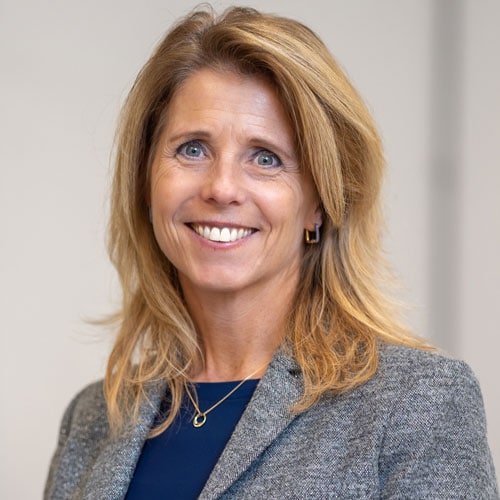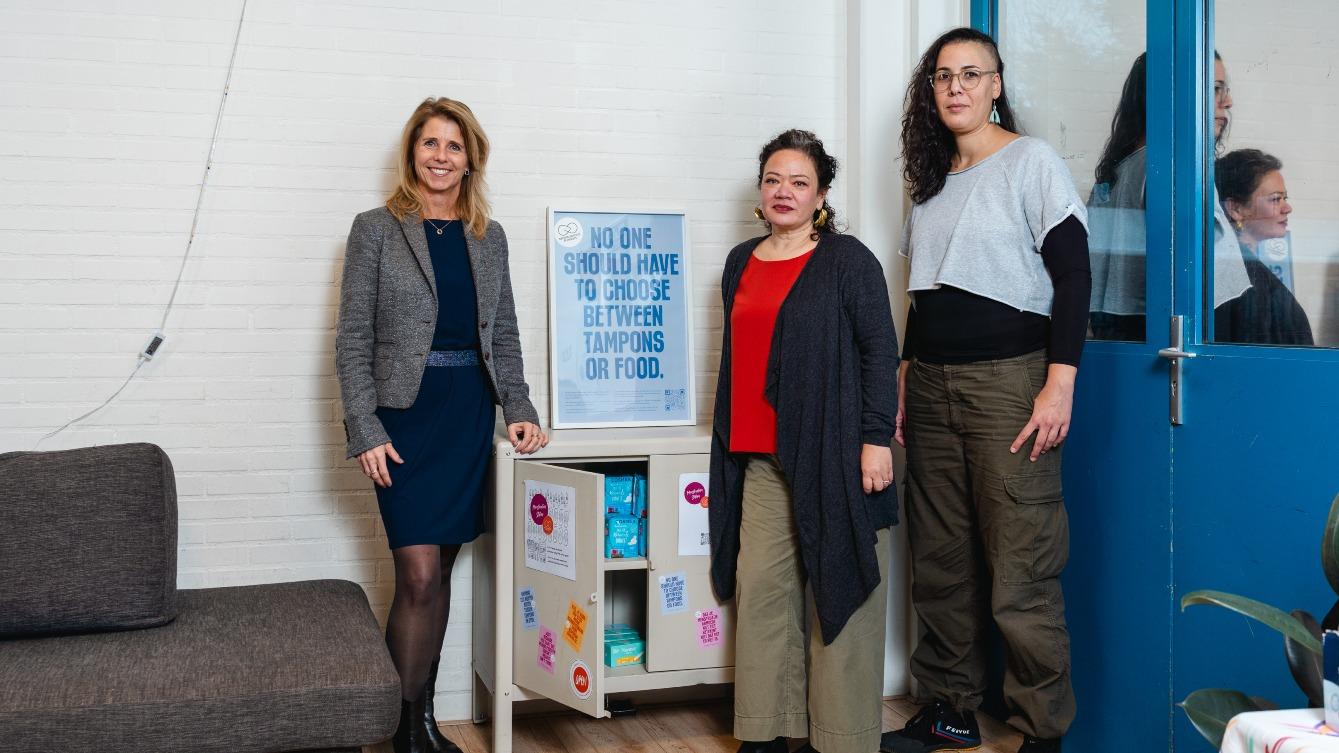From June to December 2024, Wendy and a team of colleagues partnered pro bono with Neighborhood Feminists (NF), focusing on the theme of equal opportunities. Wendy and her team were soon impressed by NF’s approach, she recalls. ‘NF addresses an urgent, but overlooked health challenge—period poverty—very locally and very practically. They combine grassroots efforts in the city of Amsterdam with research into the broader impact of their work. The data they’ve collected clearly show that their efforts have reduced period poverty in Amsterdam, boosting productivity and fostering equal opportunities. It’s a brilliant approach. What this small organisation is accomplishing in terms of social impact is exactly what we want to teach companies.’
65 Menstruation Stations
A key tool in NF’s fight against period poverty are the Menstruation Stations they have introduced: small, self-serve cabinets at 65 easily accessible locations across Amsterdam, stocked by volunteers with tampons and pads. Tammy Sheldon, Chair and Co-founder of NF, explains: ‘With these stations, we now provide over 3,500 people each month with period products they cannot afford themselves.’
Typical of the foundation’s data-driven approach, NF in 2022 launched the first-ever study on the prevalence of period poverty in Amsterdam. The findings were stark: 27% of menstruating residents had skipped purchasing essential products for financial reasons. Among young people, nearly one in five regularly missed school for lack of period products. ‘Our research revealed that thousands of individuals could only afford period products by cutting back on essentials like food, while many others resorted to alternatives like toilet paper or cloths—posing serious health and social risks – and still others simply stayed home from school or work', says team member Sara Foughali.
30,000 lives improved
Armed with these figures, NF quickly secured political attention for a municipal proposal they helped develop and funding from the City of Amsterdam. That was just the beginning. In the summer of 2024, NF conducted follow-up research on the impact of their interventions and the state of period poverty across the Netherlands. The resulting publication, Code Red 2024, became the largest study on period poverty in the country to date. Significantly, this new survey showed that the percentage of Amsterdam residents experiencing period poverty had dropped from 27% in 2022 to 14% in 2024. Explains Tammy, ‘It meant that nearly 30,000 people in Amsterdam were better able to take care of their health in 2024 than two years before. They were no longer forced to stay home from school, work, or social activities each month, and left to deal with the feelings of shame and failure typical to period poverty.’
‘What this small organisation has accomplished in terms of creating targeted, measurable social impact is exactly what we encourage businesses to aim for.’
PwC Partner Wendy van Tolshares learnings she gained during a pro bono partnership with the Neighborhood Feminists Foundation
A lifeline
PwC joined up with NF for several months in 2024 to elevate the organisation’s fundraising efforts. ‘Our goal was to help NF strengthen their positioning,’ says Wendy. ‘The foundation has received some support from the City of Amsterdam and private funds so far, but we saw opportunities to engage more corporate funding.’
Tammy adds: ‘With less governmental funding available for cultural and social organisations in the Netherlands today, fundraising has become is more challenging than ever. PwC’s expertise has been a lifeline for us. They’ve helped us translate our vision and goals into a practical strategy that will guide us effectively towards achieving both our short- and long-term objectives.”
A clear message
Wendy and her team are optimistic about NF’s potential as a fundraising partner:
‘Their whole approach makes them an attractive partner for companies looking to improve their social footprint. NF can clearly articulate the societal pain points they address and the measurable difference they make—both in the lives of individual people and across society at large. They offer a compelling narrative for businesses aiming to increase their social impact.’
Wendy also notes that NF serves as a shining example for companies: ‘Many businesses are currently struggling to calculate their social impact. We’re making a lot of progress with calculation methods for our impact on climate and nature; just think of all the carbon emission measurement tools out there. But in the social domain, we’re lagging behind. Too often, social sustainability reporting focuses on how much we invested, or on the amazing initiatives we’ve undertaken – without quantifying or mapping the actual progress achieved. With the new Corporate Sustainability Reporting Directive (CSRD) requiring far more comprehensive social sustainability reporting, the era of fuzzy narratives is over.”
From charity to solidarity
Tammy emphasises that achieving social sustainability requires solidarity, not charity. ‘Solidarity means that, whether as a business or a non-profit, you ask yourself what kind of city or country you want to live and work in. What societal pain points matter to you? Which ones are under-addressed and align with your mission, or your business model? Be in solidarity with those. That way, a small start can quickly become part of a larger movement toward a better society.’
Wendy wholeheartedly agrees. ‘Too many corporates still think of social impact as a kind of charity. But charity isn’t scalable. Businesses must integrate sustainability—social and otherwise—in their models. A company builds a need-based model around themes like equal opportunities and social sustainability will most definitely contribute to a better future. If that’s your goal, follow the examples being set by organisations like Neighborhood Feminists.’
Read more about Wendy’s insights in our Dutch article: ‘Growing Social Inequality Requires Business Action’
Contact us

















